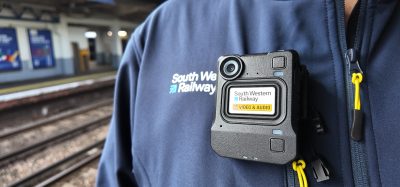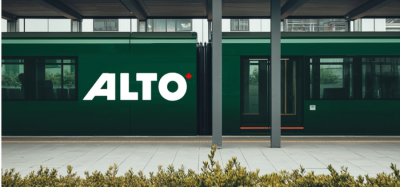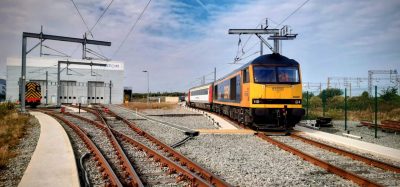Access For All: Interview with Israel Railways’ Avihu Yitzhari
Posted: 13 June 2023 | | No comments yet
For Global Railway Review’s ‘Access For All’ interview series, Avihu Yitzhari, Accessibility Officer at Israel Railways, explains the foresight, expertise and dedicated work that enables the operator to run a fully accessible means of intercity transportation.
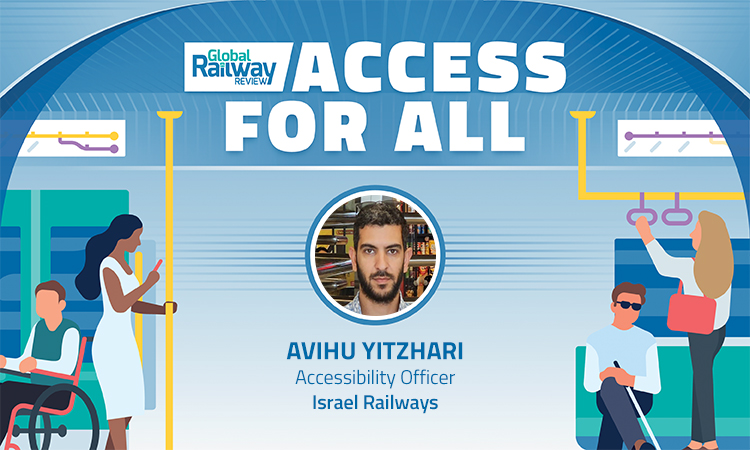

What is Israel Railways’ mission statement when it comes to accessibility?
Israel Railways’ official approach is that every person deserves freedom of movement, dignity and independence. Israel Railways has set itself the goal of promoting the issue of accessibility for people with disabilities in order to maintain these rights, and to allow passengers and company employees full equality, respectful treatment, independence and spontaneity as much as possible.
Do you think the rail industry is doing enough to ensure rail travel is accessible for all?
Israel Railways is currently the only fully accessible means of intercity transportation, and it is used by approximately 50,000-60,000 passengers with disabilities every year. All Israel Railways’ stations are accessible, and each of the approximately 600 passenger trains that operate every day has a designated car for passengers with disabilities.
In order to maintain a high level of service, and the safety of passengers, the trip requires coordination about two hours in advance in order to receive assistance in boarding at the departure station and in alighting at the destination station. For the purpose of improving accessibility and meeting the company’s targets on the subject, an ‘Accessibility Unit’ was established in 2022 with the aim of giving the field the attention it deserves and advancing it by improving the service provided to passengers, ensuring that the station buildings and complexes meet the appropriate standards, making the website and application accessible, and constantly examining emerging technologies in the field.
What on-board amenities/ facilities do Israel Railways trains offer to ensure people with disabilities have a comfortable journey?
The trains operated by Israel Railways are purchased from large and reputable international companies and meet the most advanced accessibility standards. Every train has an accessible car that includes: accessible access ways, accessible toilets, seats and priority areas for people with disabilities, public announcements and digital signage. Some trains have a button for calling for help in case of need.
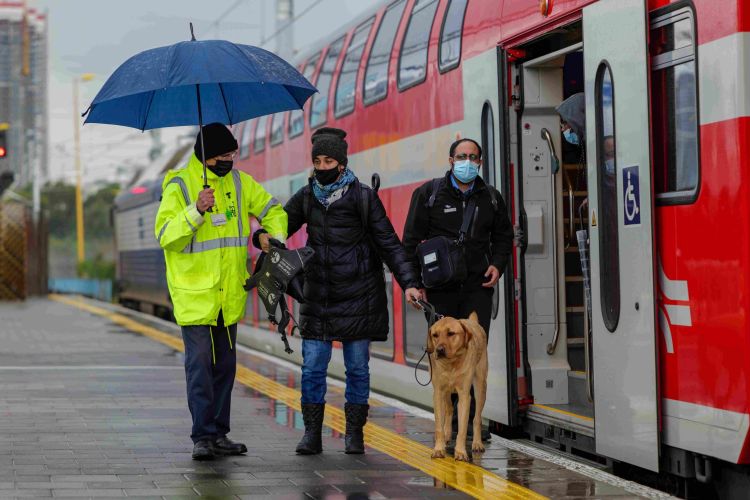

Assistance for boarding and alighting.
How does Israel Railways support individuals with disabilities to enhance their station navigation experience?
As part of the service it provides to passengers, Israel Railways has an escort system for people with disabilities, to allow safe boarding and alighting the train and to provide assistance to the passenger during the trip. In order for the station staff to be able to prepare accordingly, we recommend our passengers coordinate trips in advance by contacting our customer service online/by phone. In any event, a disabled person who arrives without prior appointment will also receive the assistance service we provide.
The service is managed by a dedicated team at the call centre that is responsible for keeping in touch with all the parties responsible for escorting the passenger, from the entrance at the departure station to the exit at the terminal station. These parties include the service teams at the origin and destination stations as well as the controller of the train which the passenger wishes to board. The role of the service team at the departure station is to escort the passenger into the accessible car and seat them safely in the priority seats for people with disabilities. During the trip, the train controller approaches the passenger to check on their well-being and answer any need that arises. At the end of the trip, a team member at the destination station, together with the controller, is responsible for escorting the passenger off the train safely and helping them exit the station.
At least two qualified accessibility consultants are involved in the design of the train stations. One consultant is involved as part of the organic planning team, and a second consultant as part of the Accessibility Unit’s control team. The organic consultant makes sure that all the requirements of the regulations and standards are implemented in the design, and the consultant on behalf of the Accessibility Unit makes sure that there is uniformity and a uniform language between all the design teams at the various stations. The team is responsible for making sure that all the requirements and standards appropriate for mass public transportation stations are met. The floor of the station features accessibility signs that include directions to the station and the platforms, the ticket office, the toilets, the ticket machine, etc. All signage designs are also checked by qualified accessibility consultants. The service providers at the stations are trained to provide service to people with disabilities, written with the help of accessibility consultants.
Also, new technologies are currently being tested that will help with orientation using smartphones. A number of pilots were carried out on the subject in the past year, including a pilot that included mapping of Tel Aviv Savidor Center station in order to make the experience at the station accessible to the visually impaired. The results of the pilot are currently being tested, and based on the conclusions, the integration of the service into the Israel Railways systems will be tested. However, at this time, no technology has yet been implemented laterally in all train stations.
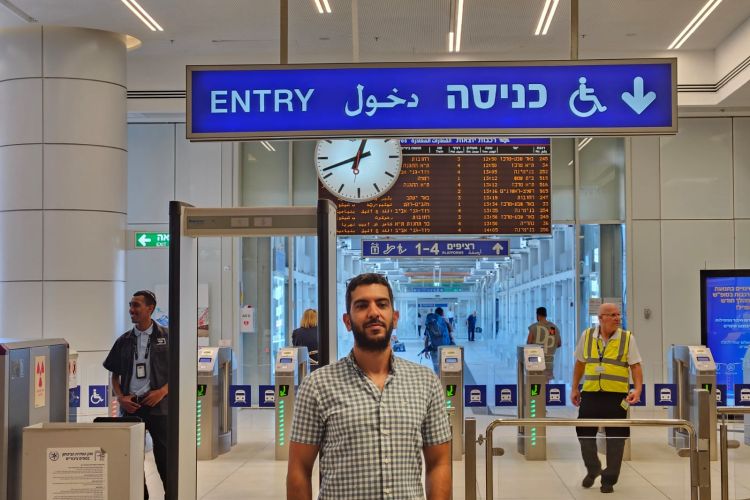

Accessible ticket gates and signs.
Is website accessibility important?
The accessibility of the website and app is very important, since these are the customers’ initial and primary link to information about the train, both for general information about the service provided by the company and for specific information about a personal trip. All information is provided to passengers via the train’s website or app. Therefore, it is important that the site is accessible in a clear and simple format and in a way that is accessible to the visually impaired and people with complete blindness. Israel Railways operates a dedicated company whose job it is to make sure that the website and the app meet the accessibility rules, and that they are maintained even after various version updates.
How does Israel Railways ensure its staff are trained to provide assistance to people with disabilities?
The Israel Railways service providers are very experienced and have been escorting people with disabilities for years and even decades. In many cases, friendships are made between service providers and passengers with disabilities, because they meet each other every morning for many years.
Israel Railways provides all service personnel with training on providing services to people with
disabilities. This training was built by Israel Railways’ internal organisational training centre and is based on the Company’s decades of experience. In addition, this plan is prepared with the help of the service accessibility consultant, who makes sure that the training plan complies with the requirements of the regulations of the State of Israel for an accessible service. The training is delivered to the employees in a theoretical and practical way, where the service providers ‘walk in the shoes’ of a disabled passenger in at least two ways. One – the employees are led around the station, from the entrance to the car, with their eyes completely covered, conveying the experience of a blind passenger. Two – employees are seated in a wheelchair and are led along the entire route that a passenger with a mobility disability takes, from the entrance to the station to the entrance to the train car. In addition, there is a routine process of learning from passengers who experience the service that we provide. From them, in a controlled manner, lessons are drawn and refinements are transferred to the service personnel in the field.
How can people with disabilities provide feedback to Israel Railways and how is this information taken forward to improve accessibility?
People with disabilities have several ways to provide feedback on Israel Railways’ service, including:
• The most common way is to contact the customer service hotline/public inquiries. A call is opened and an investigation is carried out with the relevant parties within the company in order to understand the details of the case and the chain of events. From this, lessons are learned and refinements are made to the service providers/ compensation to the customer/ coordination of expectations with the customer in order to clarify the type of service that the train is able to provide. Israel Railways’ customer service centre has advanced significantly in recent years in terms of its accessibility service to the public. In addition to a telephone service, a passenger can now also contact us via the various social networks (Facebook and Instagram), WhatsApp, and a dedicated chat on the Israel Railways app. In this way, the passenger can choose from a wide range of options suitable for them
• Another way is to directly contact the Accessibility Unit Director, whose contact details appear in the Accessibility Statement available on the Company’s website
• The control bodies of the State of Israel, external to Israel Railways, can also be contacted: the first and most important is the ‘Commission for Equal Rights for People with disabilities in the Ministry of Justice’, the body entrusted with control and enforcement of accessibility for people with disabilities in the State of Israel. Alternatively, public inquiries can also be directed to the State Controller’s Office
• Sometimes inquiries are made by people with disabilities through mainstream associations for people with disabilities, which represent the passenger.
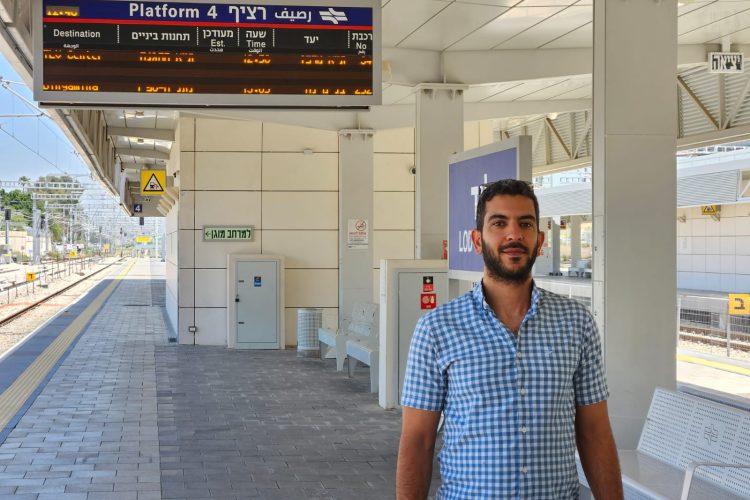

Platforms accessible for all.
How does Israel Railways collaborate with disability advocacy groups to improve accessibility for people with disabilities?
Israel Railways considers it very important to maintain contact with its passengers so that it can provide all passengers with a fair and pleasant travel experience. Therefore, Israel Railways has always maintained relationships with associations and organisations of people with various disabilities, among them Accessibility Israel, The Center for the Blind, Migdal Or, House of Wheels and more. The goal is to get to know, share and hear the wishes of passengers with disabilities and thus adapt and improve the travel experience for them. In order to achieve these goals, the new Accessibility Unit plans to establish a permanent forum that will meet regularly with representatives of various associations that represent people with disabilities, in order to improve and maintain relationships.
To what extent do you think that more needs to be done at a government level to ensure trains and stations become even more accessible?
An Accessibility Division was recently established in the Ministry of Transportation, which works with the Israel Railways Accessibility Unit on a regular basis. A permanent forum where various issues related to accessible travel will be discussed is currently being established, and a public transportation accessibility ‘master plan’ will be prepared. In this plan, long-term future steps will be taken into account in order to improve accessibility for people with disabilities travelling with Israel Railways.
Is Israel Railways currently trialling/developing any new accessibility initiatives?
Israel Railways has an Innovation Unit which works in ongoing cooperation with the Accessibility Unit with the aim of continuously identifying new technologies to improve service for people with disabilities. For example, an app that provides live sign language translation, which is suitable for the deaf, was tested recently. In addition, technology for orientation around the train stations through the smart device, showing your exact location and the walking route required to reach the points of interest at the station and the various platforms, which is suitable for people with difficulty in orientation and visually impaired/blind people, is currently being tested.
A joint professional committee was also established with the aim of finding an innovative solution that would bridge the gap between the platform and the car, a gap that exists in heavy/nationwide trains.
How does Israel Railways plan to ensure all customers feel confident while travelling with them in the future?
In order to improve accessibility on trains in the future, our recently established Accessibility Unit will invest all its efforts in finding solutions for passengers with disabilities, as well as preserving the proper service received by passengers today. In cooperation with the Ministry of Transportation, we are developing a multi-year plan that will emphasise improving accessibility in public transportation in general, and in Israel Railways in particular. In addition, we learn from parallel companies around the world and test existing solutions that could also be implemented in Israel Railways.
We believe that strengthening the interfaces within the organisation while emphasising accessibility, and synchronisation with regard to work plans and future projects, as well as constant contact with organisations that represent people with disabilities, will improve the travel experience to benefit all of our passengers.
Have you seen the other exclusive interviews from Global Railway Review with rail accessibility experts?
- Catherine Langlois, Senior Advisor – Universal Accessibility, VIA Rail – READ NOW!
- Chris Jeffery, Accessibility & Transport Integration Manager, TransPennine Express – READ NOW!
- Ronan Murphy, Head of Customer Care and Accessibility, Irish Rail – READ NOW!
- Franz Andel, Accessibility Manager at ÖBB-Personenverkehr – READ NOW!
- Sophie Court, Accessibility Improvement Manager at Govia Thameslink Railway (GTR) – READ NOW!
- Linas Baužys, CEO at LTG Link – READ NOW!
There will be other interviews over the coming weeks; participants will include DSB, ProRail, Avanti West Coast, and many more!
If you would like to take part in the Access For All series, or would like to nominate a colleague, please email: Elizabeth Jordan, Editor, Global Railway Review.
Related topics
Passenger Experience/Satisfaction, Passengers With Reduced Mobility (PRM), The Workforce




